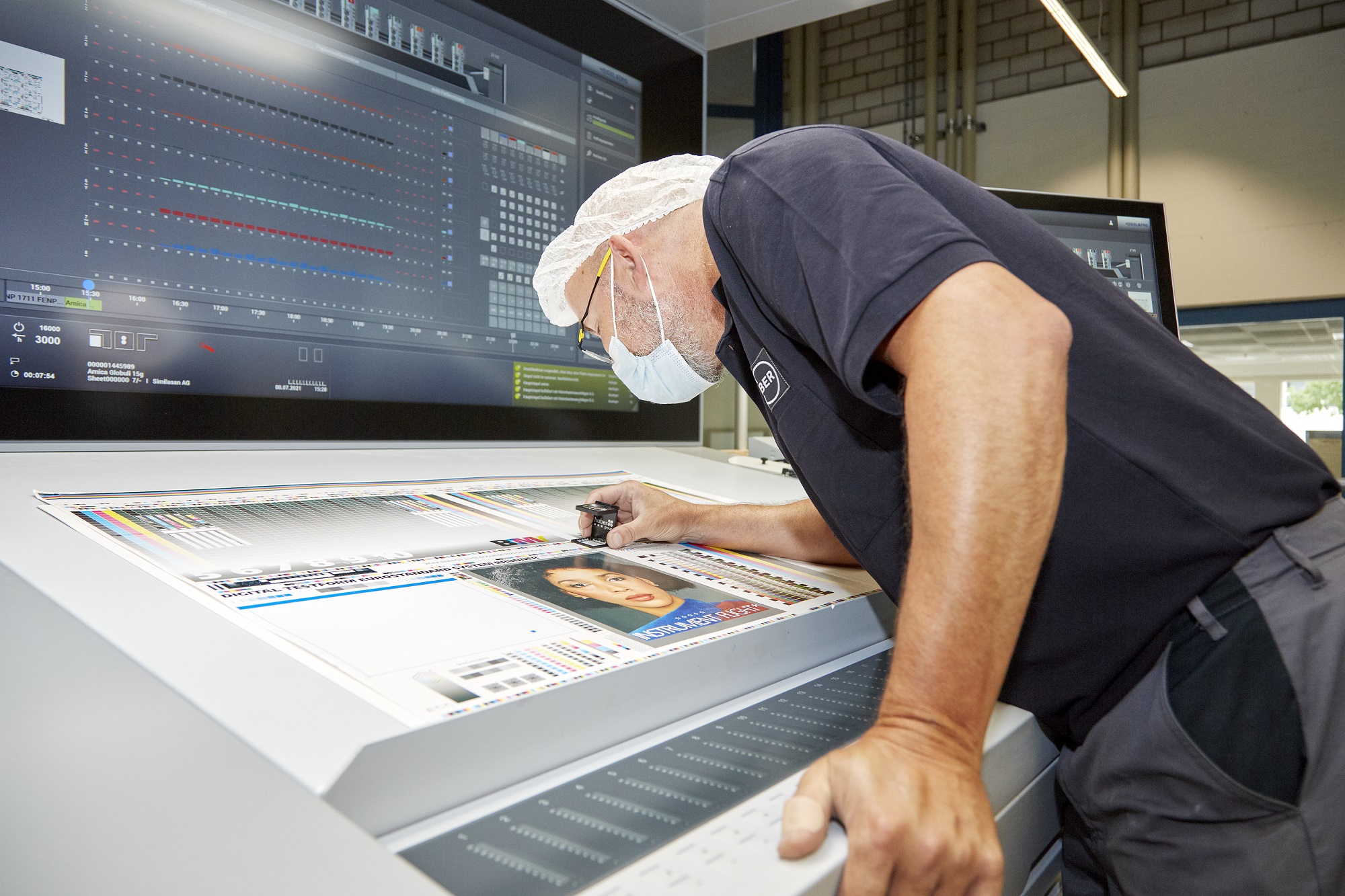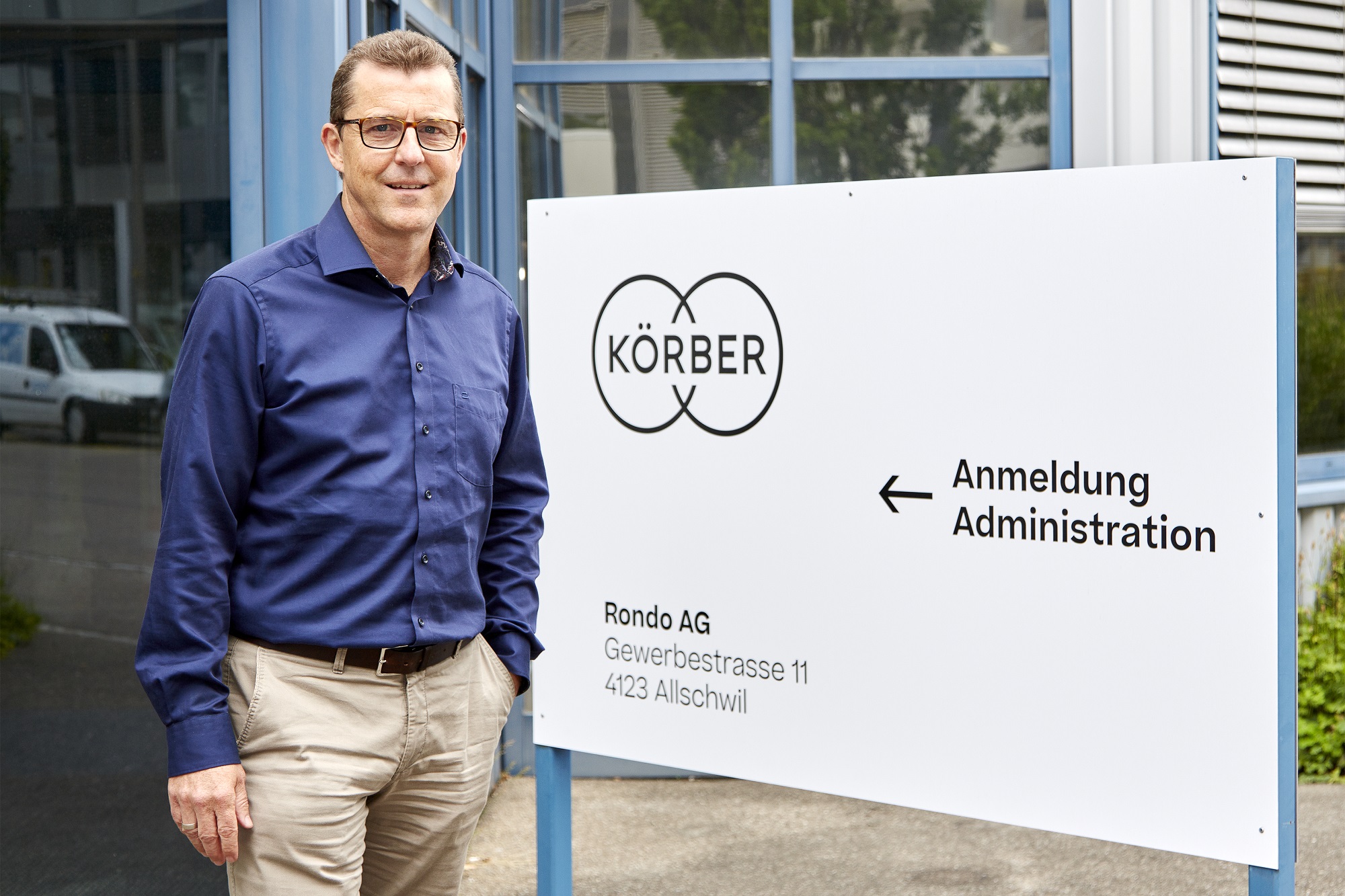Despite shrinking print runs and increasing complexity in folding carton production, all the signs are pointing to growth for the pharmaceutical packaging business of international technology group Körber. This is because the packaging specialist’s impressive delivery and quality performance makes a key contribution to its customers’ competitiveness and reliability of supply.
As paradoxical as it may initially sound, Joachim Hoeltz, Chief Executive Officer (CEO) Packaging Materials at Körber’s Swiss site in Allschwil, cites “the tougher requirements of pharmaceutical manufacturers” as one reason for this business success. Nearby Basel is one of the world’s most important hubs for the pharmaceutical industry, with correspondingly high sales. It is an industry in upheaval. Expiring patents and the growing importance of generic drugs are ramping up the pressure on costs. Extremely varied forms of administration and personalized medicines mean drugs are being produced in smaller batch sizes and with more variants.
The largest pharmaceutical groups in particular have therefore streamlined their value chain and are producing less to stock than they used to. “Secondary packaging runs are getting ever shorter and deadlines ever tighter,” explains Hoeltz. In the past twelve months alone, print runs have shrunk by a further 20 percent. This means orders – some amounting to only a few hundred sheets – often have delivery times of just two to five days. All this is significantly increasing service quality requirements – in addition to sector-specific demands such as protection against counterfeiting, complete traceability, and compliance with strict hygiene and process standards.

To keep up with the demands of multinational customers, Körber’s Pharmaceuticals business area has built up a network of four sites for its packaging materials portfolio over the past 15 years. Starting from its Swiss site in Allschwil, it first expanded to the Czech Republic and then to Puerto Rico and New Jersey in the United States. This ensures customer proximity, while the machine park with identical formats provides a reliably high delivery capability given that the sites can help each other out with global drug launches and peak loads. When it comes to the “on time in full” and “right first time” KPIs, Körber is one of the world’s best.
Manufacturing takes place based on uniform standards with press and some postpress equipment from HEIDELBERG. Each site has two complementary Speedmaster XL 106 presses to ensure on-time, fault-free production. “For around ten years now, we’ve mainly been printing on Peak Performance Class presses from HEIDELBERG. They’re the best at meeting our exceedingly high expectations in terms of quality and productivity, which makes them a vital competitive factor for us,” explains Director Operations Giovanni De Luca. Grammages of between 225 and 440 gsm are processed. Virgin fiber-based board accounts for 90 percent of the materials used, as it is dust-free and the pure white surface offers benefits during the 100 percent camera inspection.

“We make all the difference when it comes to our customers’ value creation,” says Hoeltz, summing up the way Körber’s Pharmaceuticals business area sees itself. Product innovations are important in this context, but so is progress with processes. After all, as Hoeltz is well aware: “The entire process needs to be right if we’re to achieve next-day delivery at short notice as we’ve done during the coronavirus pandemic, for example.” Körber therefore makes systematic use of digital and automated processes. One example is the supply-on-demand service for short runs. Linking print production data to the customer’s ERP system makes it possible to produce batch sizes ranging from 100 to 5,000 sheets on demand – on two Speedmaster XL 106-10-P+L presses.
The packaging specialists at Körber can offer all this because they can draw on the experience – the Körber Group is celebrating its 75th anniversary this year – and expertise of the entire Pharmaceuticals business area. With some 2,500 staff at 25 sites, this experience and expertise covers the entire pharmaceutical value chain – from consulting, packaging design, and inspection and packaging machines all the way through to handling and track & trace solutions, plus software such as the market-leading PAS-X manufacturing execution system. It’s a huge advantage. “Our customers increasingly expect complete solutions,” says Hoeltz.

At the same time, however, print runs are clearly shrinking further. The average job length in Switzerland at the moment is less than 3,000 sheets. Demands are growing, too. For example, text and images on the inside of folding cartons are increasingly being printed in four colors rather than one or two. Customers are also requesting more PANTONE® colors. “The latest press technology from HEIDELBERG is therefore vital to make us even faster, more flexible, and more productive. It’s all about being able to deliver whenever required, while also meeting customers’ exceptionally high requirements relating to quality and product safety,” explains Hoeltz in justification of the current investments. Production operations are being strengthened with a Speedmaster XL 106-8+L in Switzerland, an XL 106-10-P+LYYL in the Czech Republic, and an XL 106-10-P+L in Camden in the United States.
All Speedmaster presses have virtually the same design and are equipped for mixed operation. This creates the necessary flexibility to meet the special requirements of international customers at short notice – on a uniform basis at all sites. Automated inline color and register control using Prinect Inpress Control and the Hycolor Multidrive inking unit drive for washup processes in parallel to other makeready processes, or even during production, shorten makeready and throughput times. This saves a great deal of time, especially when frequently changing spot colors.

According to De Luca, Körber regards intelligent assistance systems, intuitive operation, and navigated printing as the main advantages of the Speedmaster 2020 generation. Intellistart 3 software calculates the quickest way of arriving at the next OK sheet, Intelliguide simulates the time-optimized workflow, and Intellirun shows operators which activities are required during production, according to the relevant situation.
“Our staff no longer need to perform standard tasks and are also guided in their decisions. This improves their ability to actually achieve the impressive productivity the press is capable of. We’re increasingly able to obtain a performance level of 18,000 sheets per hour, which boosts our efficiency and capacity utilization,” sums up De Luca. The straightforward handling of the press and its user navigation, which is geared toward a smartphone interface, are further benefits that should not be underestimated when it comes to recruiting and holding onto qualified, committed staff – because at Körber, it’s mainly the people who make all the difference.
Flurstraße 65,
33758 Schloß Holte-Stukenbrock
Germany
Tel: +49 5207 8880